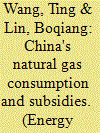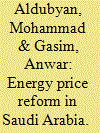| Srl | Item |
| 1 |
ID:
127279


|
|
|
|
|
| Publication |
2014.
|
| Summary/Abstract |
China's natural gas consumption is growing rapidly and it has being driven by economic growth, industrialization and urbanization. In addition, the country's low-carbon development strategy, government-controlled gas price, and some other factors also contribute to the surging gas consumption. This paper studies China's natural gas consumption in residential, industrial and commercial sectors. We adopt the cointegration test and error correction model to study the relationships of explanatory factors and gas consumption of different sectors and climate factor is included into the analysis. In order to find the direction of natural gas pricing reform and establish the benchmark gas price, this paper also estimates the size of gas price subsidy by using price-gap approach. Our findings are as follows: In the long term, China's residential sector is more sensitive to price than the other two. Urbanization is an important factor promoting industrial and commercial gas consumption. Prices of other energies have an influence on natural gas consumption significantly due to the substitutability between energies. The slow-moving and unsatisfying pricing reforms on refined oil and natural gas lead to positive price elasticity of natural gas in the commercial sector, which implies that a further energy price reform is still stringent for China.
|
|
|
|
|
|
|
|
|
|
|
|
|
|
|
|
| 2 |
ID:
176099


|
|
|
|
|
| Summary/Abstract |
Saudi Arabia has regulated domestic energy prices for decades, setting them below international market levels. Energy subsidies in Saudi Arabia are generally implicit because they lead to foregone revenues for the government. Low energy prices also encourage rapid energy demand growth and wasteful consumption, while limiting incentives to invest in energy efficiency. Saudi Arabia recently started to reform energy prices, leading to large increases in gasoline and residential electricity prices in 2018. To measure the economic and environmental impacts of energy price reform, we econometrically model gasoline and residential electricity demand using Harvey's (1990) Structural Time Series Model. Our estimated equations reveal that gasoline demand and residential electricity demand in Saudi Arabia are strongly price and income inelastic, despite the major reforms that were recently implemented. Our welfare analysis also shows that the energy price reforms in 2018 in gasoline and residential electricity respectively delivered welfare gains of 8.8 and 3.8 billion SAR annually (2.3 and 1.0 billion US$). Additionally, our decomposition analysis reveals that these energy price reforms were the largest contributors to the observed decreases in gasoline and residential electricity consumption in 2018.
|
|
|
|
|
|
|
|
|
|
|
|
|
|
|
|
| 3 |
ID:
082645


|
|
|
|
|
| Publication |
2008.
|
| Summary/Abstract |
Thirty years have passed since China first adopted the policy of reform and opening up to the outside. Reviewing and appraising the advantages and disadvantages of the government's energy restructuring policy in the intervening years is of great importance to the consideration of future reform and opening-up efforts in this industry. Energy production and supply have been a major part of the national economic restructuring. In this paper, the author proceeds from three angles to review and assess the reform and opening-up efforts in the energy industry, and suggests some direction and priorities for its restructuring in the future.
|
|
|
|
|
|
|
|
|
|
|
|
|
|
|
|
| 4 |
ID:
175237


|
|
|
|
|
| Summary/Abstract |
This study investigates the drivers of residential electricity demand in Saudi Arabia at a regional level for the period 1990–2018 using Structural Time Series Modeling. We find that Saudi Arabia's two waves of energy price reforms in 2016 and 2018 have had different impacts on residential electricity consumption across its regions. The empirical estimation results show that the long-run price responses of residential electricity demand vary across regions: from −0.20 in the Central region to −0.46 in the Eastern region. The short-run elasticities are −0.10 for the Central and Western regions, −0.15 in the Southern region, while the Eastern region's demand does not respond to price changes in the short run. The long run income elasticities of the regions' residential electricity demand also differ considerably: from 1.02 in the Western region to 0.27 in the Eastern region. The short-run income elasticities are 0.14 and 0.43 for the Eastern and Western regions, respectively while the residential electricity demand in the Central and Southern regions' does not react to income changes. We further estimate that hot weather conditions significantly impact all regions' residential electricity demand. Finally, we find that all regions saw some efficiency improvements in light of the energy price reforms, although there is a room for further improvements. The findings of the study can be useful for policymakers through the ways that we discussed in the paper.
|
|
|
|
|
|
|
|
|
|
|
|
|
|
|
|
| 5 |
ID:
084709


|
|
|
|
|
| Publication |
2008.
|
| Summary/Abstract |
This article examines the effect of increased state control over the Russian gas sector and its ultimate impact on energy security in Europe. The various mechanisms by which the state has acquired ownership (or quasi-ownership) over several independent gas producers as well as the potential dangers this poses for European energy supplies are scrutinised. Due to the demonstrated inefficiency of Russian state-controlled companies, negative consequences, such as slowed production growth, are likely to result. The few remaining independent gas producers are still hampered in their development due to the government's reluctance to implement structural reforms in the Russian gas sector.
|
|
|
|
|
|
|
|
|
|
|
|
|
|
|
|